A boxing ring or boxing arena is the space where a boxing match takes place. In this article we are going to see what a boxing ring is like and its parts . Today's rings consist of an elevated square platform, where there is a post in each corner. 4 ropes are also fastened around the posts, in parallel. The ropes are always in tension thanks to tensioners. The ropes are what delimit the area where the boxers will fight.
Definition: Boxing ring or arena and the parts that compose it
Boxing ring and its measurements / boxing ring dimensions
Since there are several professional boxing organizations, the dimensions and size of a professional boxing ring will vary . Regarding the most standard boxing ring and its measurements, we can say that it is between 4.9 and 6.1 meters (or between 16 and 20 feet) in the area inside the ropes. To this we must add about 0.61 more meters (or 2 feet) for the part that is outside the ropes.
The platform of a boxing ring is raised off the ground by 0.91 to 1.22 meters (or 3 to 4 feet). The platform is covered with padding of about 25 mm (1 inch). A stretched tarp is placed on top of it .
Another part of a boxing ring are the ropes , which usually have a diameter of 25 mm and are located at the following heights: 0.46 m, 0.76 m, 1.07 m and 1.37 m (in feet : 18, 30, 42 and 54 inches). They are held together with rope clips , so that they do not separate too much from each other.
Regarding the ideal environment for a fight inside a boxing ring, the following things must be guaranteed:
- Lighting in the ring must be maximized.
- The heat given off by said lighting must be minimized.
- As far as possible, lighting on the sides of the ring must be removed.
A review of the boxing ring and its parts (each one)
The parts that make up the quadrilateral are the following.
Platform
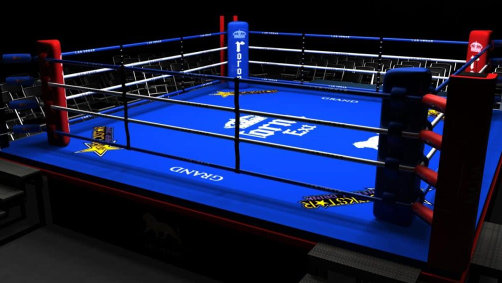
It is usually made of wood and is present in competition rings. The referee and the fighters stand on it, and the fight takes place. It rises from the ground at 0.91 - 1.22 meters. Many training or gym rings do not have this element, since they are flat rings on the ground.
Staircase or ladder
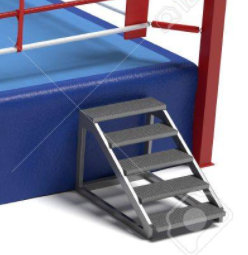
It is usually made of metal or wood and gives access to each fighter's corner.
Poles
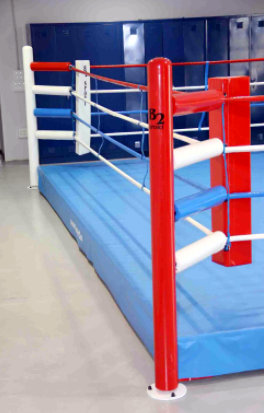
There are 4 posts and they are located in each corner. The tensioners are fixed to the posts, which in turn are hooked to the ropes. They are outside the fighting area, so that the boxers do not run into them or get hurt.
Tensioners
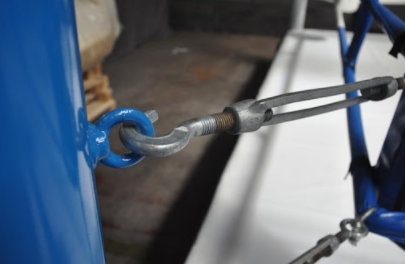
Boxing ring turnbuckles serve to keep the ropes stretched. They are the link between the ropes and the pole. A professional 4-rope ring has 16 turnbuckles ; 4 in each corner.
Tensioner covers
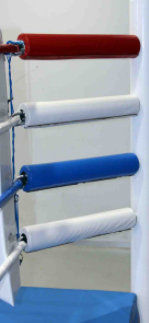
Decoration, usually padded, that is placed on top of each turnbuckle. They can be of various colors, and can carry the insignia of each fighter, competition, club...
Ring ropes

A classic professional ring has 4 ropes in parallel, which delimit the fighting area . They are usually between 25 and 28 mm in diameter. They must be kept tense so that the boxers do not leave the ring during the fight. Gym training rings can have fewer ropes (2, 3...). Its length depends on the size of the ring you want to assemble: 7 x 7, 6 x 6, 5 x 5, etc.
Rope Cover
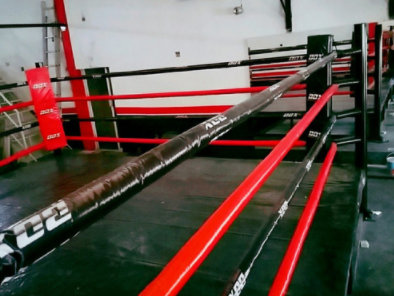
They are the linings that are placed on top of the ring ropes. In professional rings, rope covers are usually padded , made of a material such as PU, to cushion the weight of the boxers.
Rope holder
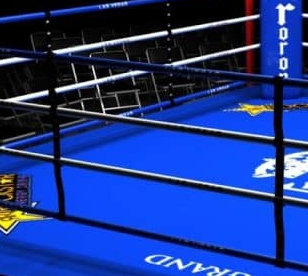
There are usually 2 for each side of the ring; A total of 8 rope holders. They are placed vertically and their function is to prevent the 4 ropes from separating from each other .
Corners
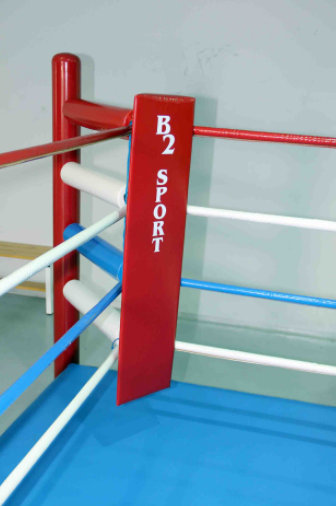
One goes in each corner and its function is to cushion the boxer if he collides with the corner. Therefore, these parts of the ring are also padded. The colors of the corner units are usually: 2 white, 1 red and 1 blue. The red one is placed in the red boxer's corner, and the blue one in the blue boxer's corner; White is placed in the other two remaining corners. They may have a logo or badge.
Canvas, the part of the boxing ring on which the boxers fight
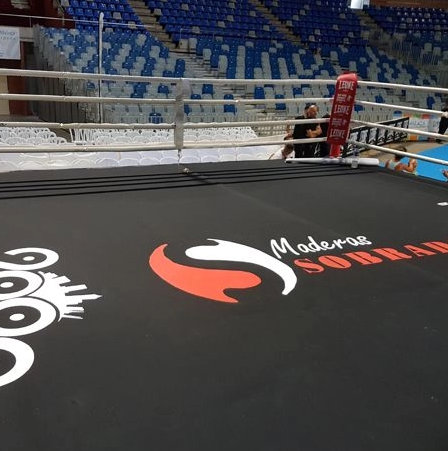
The canvas in a ring is that part that covers the entire fighting area. The boxers fight on the canvas. It can be made of PVC-like material or fabric. The important thing about the tarp is that it does not slip. Normally, it has a logo in the center (of the competition, club, event, advertising, etc.).
Skirt
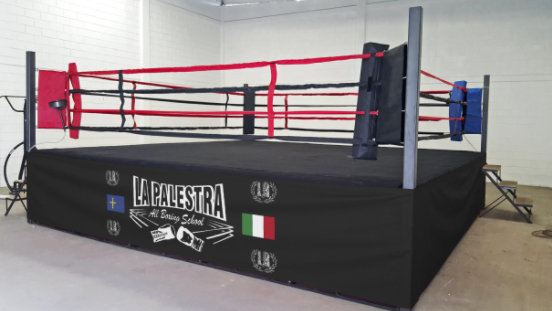
The last element to dress a ring is the skirt. It turns the ring platform around on all 4 sides. It can have logos and advertising printed on it.
Corner stools for boxer
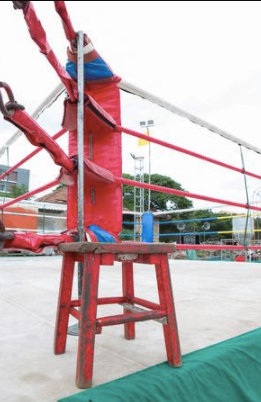
Corner stools are introduced at the break of each round and are placed in each boxer's corner. There is one red and one blue, according to the respective color of each fighter. They serve for the boxer to sit down to rest and receive assistance from the trainer: hydration, cleaning sweat or blood, placing the bandage and adjusting the gloves, etc.
Gong, another part of a boxing ring
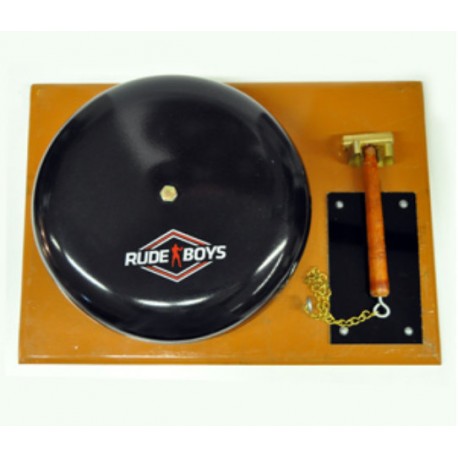
The gong is an instrument that serves to sound the alarm for the start or end of an assault.
You have already seen everything about the boxing ring and its parts ; but stay a little longer, since now you are going to learn several curiosities about boxing rings .
What is the difference between boxing ring and wrestling arena?
Although the wrestling ring shares similarities with the boxing ring, the way it is constructed is different. The wrestling one only has 3 ropes (which can be made of coated steel cable); and is designed to provide a more flexible surface than that of the boxing ring. That is the main difference in boxing ring and wrestling one.
Why in English is the original word ring, which means "circular", when it is actually square?
The English boxing ring was given the name "ring" as a relic, since at the beginning of the activity a circle (ring) was drawn on the ground, where the fight took place. Since then we call it that.
The word ring continued to be used with the London Prize Ring Rules (1743) , which specified a small circle in the center of the fighting area, where boxers gathered before beginning each round.
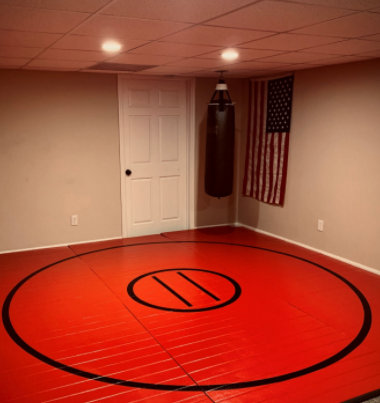
The first professional boxing ring as we know it would not appear until 1838, the year it was introduced by the Pugilistic Society. The size of that boxing ring was 7.3 meters (24 feet) and it already had the ropes.
These are the reasons why in a boxing ring the name is ring too. Additionally, it is colloquially called the "square circle." And the famous English expression "ringside seat" dates back to the 1860s.









